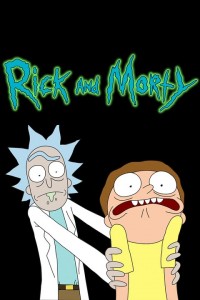The Sad and Silly World of Rick and Morty

The Saturday morning cartoon has long been a hallmark of many kids’ weekend. Back in my parents’ day, this meant shows like Looney Toons and Super Friends, while for me it meant Dexter’s Laboratory, Samurai Jack, X-Men, and darker shows like Courage the Cowardly Dog and Ren and Stimpy.
Contemporary cartoons have a much wider audience, and a large part of this demographic expansion is due to the increasing sophistication of the animated world. Sure, there are still plenty of kids’ cartoons left like Foster’s Home for Imaginary Friends, but many animated shows such as Archer and BoJack Horseman appeal to an older crowd by tackling adult situations and problems through the animated medium. Similarly, a growing number of children’s cartoons, such as Adventure Time, address more serious themes like parental abandonment, unrequited love, and the existential angst associated with becoming a teenager, while presenting this material in a way that a young audience can understand and enjoy.
Rick and Morty, airing every Sunday on Adult Swim (part of the Cartoon Network), is definitely part of this new wave of “mature cartoons.” Created by Justin Roiland and Dan Harmon (famous for his work on the TV show Community), Rick and Morty follows the Smith family—in particular Morty Smith and his mad-scientist grandfather Rick Sanchez as they navigate family squabbles and intergalactic space travel.
A common theme of the show is the impact of humanity, and in particular Rick and Morty, on our own world and on the planets they travel to either by spaceship or teleportation. Often, Rick’s nihilistic apathy or Morty’s well-intentioned but often disastrous interventionism will lead to catastrophic consequences such as the destruction of Earth or of a galactic civilization. One of the values that the show’s creators seem determined to reinforce is the idea that our actions, regardless of intent, have real-life consequences that can negatively impact those we love and care about, and that life is fairly unpredictable.
While this message is one that’s easy for all ages to understand, Rick and Morty has a tendency to also try to speak to problems that affect an older audience. A constant theme of this show is the sadness and sense of purposelessness that many people experience as they get older and realize that the exciting fables they were told as children, including religious ones, are just not true.
A good example of this is when Morty’s older sister finds out her conception was an “accident” and wonders why she is alive and if there is meaning to her life. Morty responds by pointing out a window to some large clumps of dirt, which he reveals to be his own buried, decomposing body. Morty reveals that he and his grandpa Rick are actually from a parallel universe where humanity died. When they travelled to this version of reality to escape their own horrific reality, they discovered that the Rick and Morty of this reality had died just moments before in a flawed experiment. The Rick and Morty from the old reality buried the newly dead versions of themselves and then assimilated into their family, whose members are completely unaware of what happened or the fact that the Rick and Morty they now know are actually from a parallel universe. Morty concludes by telling his sister, “Nobody exists on purpose, nobody belongs anywhere, everybody’s gonna die. Come watch TV.”
While this seems especially dark, it’s intended to be comforting to those, like Morty’s sister, who are hung up on the apparent meaningless nature of existence. For many people the idea that we weren’t created for a special reason or purpose can be soul-crushing and utterly debilitating, but to Rick and Morty this is just the way life is and always was. To them, there is no reason to get depressed by a lack of existential meaning when life is full of wonder and the unknown, things that may not give a person an answer to why we exist but can provide a purpose for that existence. This sense of purpose can be found in a variety of things, from exploring the unknown to perfecting a skill or hobby. Essentially, what Roiland and Harmon are trying to say is that what we find enjoyment doing, combined with the interesting things that result from the random nature of life, is far more important than philosophical and unanswerable questions about meaning.
That’s not to say that the show is all gloom and doom. In fact, Rick and Morty is silly beyond belief, with nonsensical catchphrases, hilarious character names, and a general tone of absurdity that keeps the pace lively and allows the dramatic moments to shine when they do appear. But the show attempts to be true to life in that not everything is fun and games, and bad things do happen on occasion. What’s totally endearing about the show is that in between the aliens and the quantum teleportation devices are emotionally distressing human problems being addressed without the crutches of religion or wishful thinking. It’s a bit strange that a cartoon would lead the way in addressing some of the biggest philosophical problems of the postmodern age, but Rick and Morty does it exceptionally well, and at least lets you laugh in between the tears.
